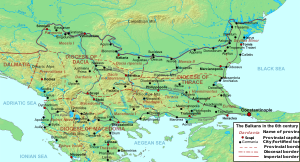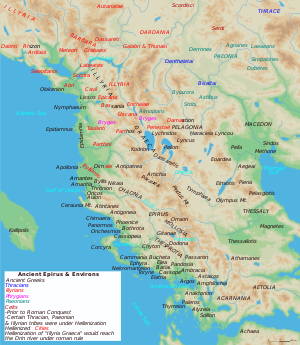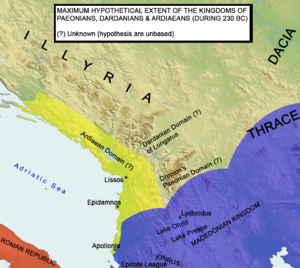درداني
درداني (Dardani ؛ /ˈdɑːrdənaɪ/؛ باليونانية قديمة: Δαρδάνιοι, Δάρδανοι؛ لاتينية: Dardani)، أو الدردانيون (Δαρδανίωνες ؛ Dardanians) كانوا قبيلة من الهندو-أوروپيين الأوائل استقرت في المنطقة التي أخذت اسمها منهم، دردانيا،[1][2] في منطقة اتصال التراقية-الإليرية. تمييزهم كقبيلة إما إليرية أو تراقية هو غير أكيد.[3][4][5] فهم وإقليمهم كانوا، حسب معظم الكتاب، لا يُعتبرون جزءاً من إليريا.[6]
أصل الاسم
The ethnonym was spelled in Greek as Dardaneis, Dardanioi and Dardanoi, and in Latin as Dardani.[7]
In 1854 within the context of 19th century historical linguistics, Johann Georg von Hahn was the first to propose that the names Dardanoi and Dardania were derived from a proto-Albanian word, meaning pear tree (dardha in modern Albanian the definite form, dardhë indefinite form < PAlb *dardā[8][9]), in view of the fact that toponyms related to fruits or animals are not unknown in the region (cf. Alb. dele/delmë "sheep" supposedly related to Dalmatia, Ulcinj in Montenegro < Alb. ujk, ulk "wolf" etc.). Opinions differ whether the ultimate etymon of this word in Proto-Indo-European was *g'hord-, or *dheregh-.[10]
The term used for their territory was Dardanike (Δαρδανική),[11] while other tribal areas had more unspecified terms, such as Autariaton khora (Αὐταριατῶν χώρα), for the "land of Autariatae."
الأصل حسب الأساطير اليونانية
In Greek mythology, Dardanos (Δάρδανος), one of the sons of Illyrius (the others being Enchelus, Autarieus, Maedus, Taulas, and Perrhaebus) was the eponymous ancestor of the Dardanoi (Δάρδανοι).[12] Some Roman ethnographers proposed a connection between Dardani of the Balkans and the Dardans of Troy, having a group of Dardan colonists settle in the Balkans and subsequently degenerate into a state of barbarism,[13] but the Romans[14] considered them to be Greeks as a whole, which contradicts modern scholarship.
التاريخ
القرن الرابع ق.م.
الفترة الرومانية
مقدونيا وإليريا أصبحتا محميتين رومانيتين في 168 ق.م.[15]
وفي 97 ق.م. the Dardani are mentioned again, defeated by the Macedonian Roman army.[16] In 88 BC, the Dardani invaded the Roman province of Macedonia together with the Scordisci and the Maedi.[17][المصدر لا يؤكد ذلك]
وحسب سطرابون في كتابه جيوگرافيكا (المجمَّع في 20 ق.م.–23 م)، they were divided into two sub-groups, the Galabri and the Thunatae.[18]

It seems quite probable that the Dardani actually lost independence in 28 BC thus, the final occupation of Dardania by Rome has been connected with the beginnings of Augustus' rule in 6 AD, when they were finally conquered by Rome. Dardania was conquered by Gaius Scribonius Curio and the Latin language was soon adopted as the main language of the tribe as many other conquered and Romanized.[19]
الثقافة
اللغة
An extenstive study based on onomastics has been undertaken by Radoslav Katičić which puts the Dardani language area in the Central Illyrian area ("Central Illyrian" consisting of most of former Yugoslavia, north of southern Montenegro to the west of Morava, excepting ancient Liburnia in the northwest, but perhaps extending into Pannonia in the north).[20][21]
أشخاص بارزون
- بارديلس[22] من الدرداني من 385–358 ق.م.
- أوداتا ربما ابنة بارديلس وزوجة فيليپ الثاني تزوجها بعد المعركة في 358.[23]
- كليتوس، ابن بارديلس، القرن الرابع ق.م.[24]
- بارديلس الثاني، ربما ابن كليتوس، القرن الرابع ق.م.[25]
- بيركنا حفيدة كليتوس[26] و ابنة بارديلس الثاني.[25] وكانت زوجة پيرَّس من إپيروس.
- بارديلس الثاني، ربما ابن كليتوس، القرن الرابع ق.م.[25]
- لونگاروس[27]
انظر أيضاً
- الديانة البلقانية العتيقة
- قبل التاريخ في جنوب شرق أوروپا
- إليريا
- قائمة القبائل القديمة في إليريا
- الحروب الإليرية
المراجع
- ^ "Δαρδάνιοι, Δάρδανοι, Δαρδανίωνες" Dardanioi, Georg Autenrieth, "A Homeric Dictionary", at Perseus
- ^ Latin Dictionary
- ^ Wilkes 1992, p. 85
Whether the Dardanians were an Illyrian or a Thracian people has been much debated and one view suggests that the area was originally populated with Thracians who then exposed to direct contact with illyrians over a long period.
- ^ Papazoglu 1978, p. 131
the Dardanians ... living in the frontiers of the Illyrian and the Thracian worlds retained their individuality and, alone among the peoples of that region, succeeded in maintaining themselves as an ethnic unity even when they were militarily and politically subjected by the Roman arms [...] and when, towards the end of the ancient world, the Balkans were involved in far-reaching ethnic perturbations, the Dardanians, of all the Central Balkan tribes, played the greatest part in the genesis of the new peoples who took the place of the old
- ^ Waldman, Carl; Mason, Catherine (2006). Encyclopedia of European Peoples. Infobase Publishing. p. 205. ISBN 1438129181.
According to ancient sources, the Dardani - variously grouped but probably Illyrians - lived west of present-day Belgrade in present-day Serbia and Montenegro in the third century B.C.E, their homeland in the ancient region of Thrace (and possibly there since the eight century B.C.E).
- ^ Papazoglu 1978, p. 217, Papazoglu 1969
- ^ Papazoglu 1969, p. 201.
- ^ Albanian Etymological Dictionary, V.Orel, Koninklijke Brill ,Leiden Boston Köln 1998, p.56
- ^ Wilkes, John (1992). The Illyrians. Wiley. p. 244. ISBN 9780631146711.
{{cite book}}: Invalid|ref=harv(help) "Names of individuals peoples may have been formed in a similar fashion, Taulantii from ‘swallow’ (cf. the Albanian tallandushe) or Erchelei the ‘eel-men’ and Chelidoni the ‘snail-men’. The name of the Delmatae appears connected with the Albanian word for ‘sheep’ delmë) and the Dardanians with for ‘pear’ (dardhë)." - ^ Elsie, Robert (1998): "Dendronymica Albanica: A survey of Albanian tree and shrub names". Zeitschrift für Balkanologie 34: 163-200 online paper
- ^ Papazoglu 1978, p. 523
- ^ Appian, The Foreign Wars, III, 1.2
- ^ Wilkes 1992, p. 220
Leaving aside Strabo's comment on the dirty habits of the Dardanians, there is little on which to judge the general health of the Illyrian population.
- ^ Greeks and Barbarians (Edinburgh Readings on the Ancient World) by T. Harrison, 2001, ISBN 0-415-93959-3, p. 140
- ^ Papazoglu 1978, p. 173.
- ^ Mócsy 2014, p. 15.
- ^ Wilkes 1992, p. 140
... Autariatae at the expense of the Triballi until, as Strabo remarks, they in their turn were overcome by the Celtic Scordisci in the early third century
- ^ Strabo: Books 1‑7, 15‑17 in English translation, ed. H. L. Jones (1924), at LacusCurtius
- ^ http://www.balkaninstitut.com/pdf/izdanja/B_XXXVII_2007.pdf
- ^ Katičić, Radoslav (1964b) "Die neuesten Forschungen über die einhemiche Sprachschist in den Illyrischen Provinzen" in Benac (1964a) 9-58 Katičić, Radoslav (1965b) "Zur frage der keltischen und panonischen Namengebieten im römischen Dalmatien" ANUBiH 3 GCBI 1, 53-76
- ^ Katičić, Radoslav. Ancient languages of the Balkans. The Hague - Paris (1976)
- ^ خطأ استشهاد: وسم
<ref>غير صحيح؛ لا نص تم توفيره للمراجع المسماةHarding-1985-93 - ^ Heckel 2006, p. 64
- ^ خطأ استشهاد: وسم
<ref>غير صحيح؛ لا نص تم توفيره للمراجع المسماةWilkes 1996 120 - ^ أ ب Heckel 2006, p. 86
- ^ Hammond 1988, p. 47
- ^ أ ب Wilkes 1992, p. 86
... including the names of Dardanian rulers, Longarus, Bato, Monunius and Etuta, and those on later epitaphs, Epicadus, Scerviaedus, Tuta, Times and Cinna. Other Dardanian names are linked with...
المصادر
- Mócsy, András (2014) [1974]. Pannonia and Upper Moesia: A History of the Middle Danube Provinces of the Roman Empire. New York: Routledge.
{{cite book}}: Invalid|ref=harv(help) - Papazoglu, Fanula (1978). The Central Balkan Tribes in pre-Roman Times: Triballi, Autariatae, Dardanians, Scordisci and Moesians. Amsterdam: Hakkert.
{{cite book}}: Invalid|ref=harv(help) - Wilkes, John (1996) [1992]. The Illyrians. Wiley. ISBN 978-0-631-19807-9.
{{cite book}}: Invalid|ref=harv(help) - Lewis, D. M.; Boardman, John (1994). The Cambridge Ancient History. Cambridge University Press. ISBN 978-0-521-23348-4.
- Hammond, Nicholas Geoffrey Lemprière (1988). A History of Macedonia: 336-167 B.C. Oxford University Press. ISBN 978-0-19-814815-9.
{{cite book}}: Invalid|ref=harv(help) - Heckel, Waldemar (2006). Who's Who in the Age of Alexander the Great: Prosopography of Alexander's Empire. Wiley. ISBN 978-1-4051-1210-9.
{{cite book}}: Invalid|ref=harv(help) - Petrović, Vladimir P. (2006). "Pre-roman and Roman Dardania historical and geographical considerations". Balcanica (37): 7–23.[dead link]
- Savić, M. M. (2015). "Material culture of Dardan's in pre-roman period". Baština (39): 67–84. (صربية)
وصلات خارجية
- Articles containing Ancient Greek (to 1453)-language text
- Articles containing لاتينية-language text
- Pages using Lang-xx templates
- Articles with hatnote templates targeting a nonexistent page
- مقالات ذات عبارات بحاجة لمصادر
- Articles with dead external links from December 2016
- درداني
- قبائل إليرية
- قبائل تراقية
- تراقو-إليريون
- شعوب هندو-اوروبية
- قبائل قديمة في مقدونيا
- قبائل قديمة في شمال مقدونيا
- قبائل قديمة في كوسوڤو
- موئسيا
- قبائل قديمة في صربيا
- قبائل هزمتها روما
- قبائل هزمتها الجمهورية الرومانية

